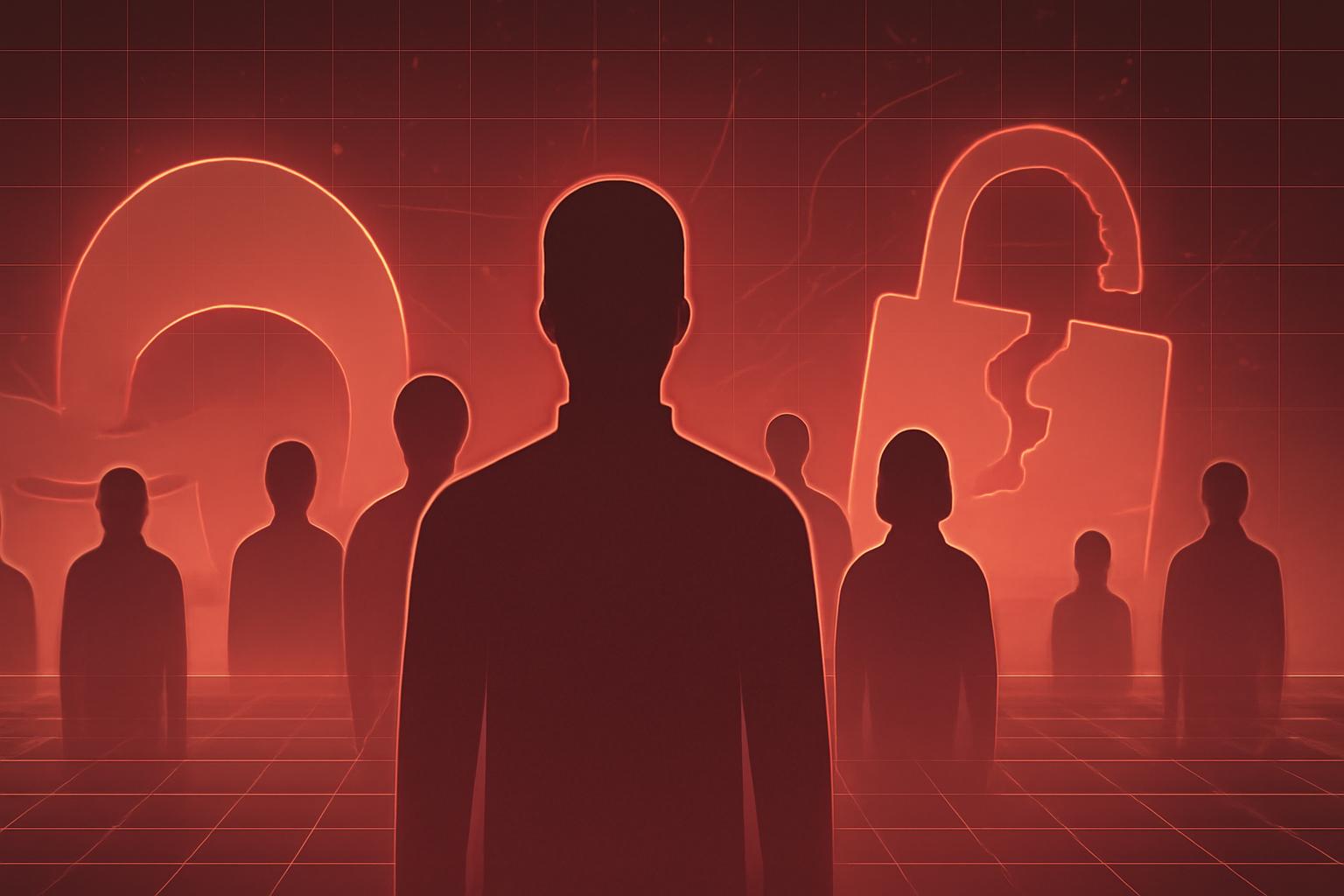South Korea’s rapid digital evolution is undermined by persistent cybersecurity weaknesses, reflected in frequent breaches and fragmented governance. The government’s recognition of these issues and efforts to implement cross-agency coordination mark a crucial step forward, but structural and workforce challenges remain significant. !-- wp:paragraph -->
Contents
FinOracleAI — Market ViewFinOracleAI — Market ViewFinOracleAI — Market ViewGovernment Steps Toward Coordinated Cybersecurity StrategyFinOracleAI — Market View2025 Cyberattack Timeline: A Surge of IncidentsGovernment Steps Toward Coordinated Cybersecurity StrategyFinOracleAI — Market View2025 Cyberattack Timeline: A Surge of IncidentsGovernment Steps Toward Coordinated Cybersecurity StrategyFinOracleAI — Market ViewCritical Shortage of Cybersecurity Experts2025 Cyberattack Timeline: A Surge of IncidentsGovernment Steps Toward Coordinated Cybersecurity StrategyFinOracleAI — Market ViewCritical Shortage of Cybersecurity Experts2025 Cyberattack Timeline: A Surge of IncidentsGovernment Steps Toward Coordinated Cybersecurity StrategyFinOracleAI — Market ViewFragmented Cybersecurity Governance Hampers ResponseCritical Shortage of Cybersecurity Experts2025 Cyberattack Timeline: A Surge of IncidentsGovernment Steps Toward Coordinated Cybersecurity StrategyFinOracleAI — Market ViewFragmented Cybersecurity Governance Hampers ResponseCritical Shortage of Cybersecurity Experts2025 Cyberattack Timeline: A Surge of IncidentsGovernment Steps Toward Coordinated Cybersecurity StrategyFinOracleAI — Market ViewSouth Korea’s Cybersecurity Under Strain Amid Rising Digital ThreatsFragmented Cybersecurity Governance Hampers ResponseCritical Shortage of Cybersecurity Experts2025 Cyberattack Timeline: A Surge of IncidentsGovernment Steps Toward Coordinated Cybersecurity StrategyFinOracleAI — Market View
- Opportunities: Establishing a central coordination body with clear authority can streamline incident response and policy implementation.
- Investment in cybersecurity workforce development is critical to build sustainable, proactive defenses.
- Leveraging advanced AI and threat intelligence can improve detection and mitigation of sophisticated attacks.
- Strengthening legal frameworks to enable timely government intervention enhances resilience.
- International cooperation may help counter North Korea-linked cyber espionage campaigns.
- Risks: Centralizing cybersecurity authority risks politicization and potential abuse of power without proper oversight.
- Continued fragmentation and inter-agency rivalry may delay critical responses.
- Persistent talent shortages could leave critical vulnerabilities unaddressed.
- Ongoing sophisticated attacks, including AI-driven methods, may outpace defensive capabilities.
FinOracleAI — Market View
South Korea’s rapid digital evolution is undermined by persistent cybersecurity weaknesses, reflected in frequent breaches and fragmented governance. The government’s recognition of these issues and efforts to implement cross-agency coordination mark a crucial step forward, but structural and workforce challenges remain significant. !-- wp:paragraph -->- Opportunities: Establishing a central coordination body with clear authority can streamline incident response and policy implementation.
- Investment in cybersecurity workforce development is critical to build sustainable, proactive defenses.
- Leveraging advanced AI and threat intelligence can improve detection and mitigation of sophisticated attacks.
- Strengthening legal frameworks to enable timely government intervention enhances resilience.
- International cooperation may help counter North Korea-linked cyber espionage campaigns.
- Risks: Centralizing cybersecurity authority risks politicization and potential abuse of power without proper oversight.
- Continued fragmentation and inter-agency rivalry may delay critical responses.
- Persistent talent shortages could leave critical vulnerabilities unaddressed.
- Ongoing sophisticated attacks, including AI-driven methods, may outpace defensive capabilities.
“A central body should set strategy and coordinate crisis response, while expert agencies handle technical execution under clear rules and oversight,” Pak explained. The Ministry of Science and ICT, together with KISA and other agencies, reaffirmed their commitment to counter increasingly sophisticated cyber threats and to protect businesses and the public.
!-- wp:paragraph -->FinOracleAI — Market View
South Korea’s rapid digital evolution is undermined by persistent cybersecurity weaknesses, reflected in frequent breaches and fragmented governance. The government’s recognition of these issues and efforts to implement cross-agency coordination mark a crucial step forward, but structural and workforce challenges remain significant. !-- wp:paragraph -->- Opportunities: Establishing a central coordination body with clear authority can streamline incident response and policy implementation.
- Investment in cybersecurity workforce development is critical to build sustainable, proactive defenses.
- Leveraging advanced AI and threat intelligence can improve detection and mitigation of sophisticated attacks.
- Strengthening legal frameworks to enable timely government intervention enhances resilience.
- International cooperation may help counter North Korea-linked cyber espionage campaigns.
- Risks: Centralizing cybersecurity authority risks politicization and potential abuse of power without proper oversight.
- Continued fragmentation and inter-agency rivalry may delay critical responses.
- Persistent talent shortages could leave critical vulnerabilities unaddressed.
- Ongoing sophisticated attacks, including AI-driven methods, may outpace defensive capabilities.
“A central body should set strategy and coordinate crisis response, while expert agencies handle technical execution under clear rules and oversight,” Pak explained. The Ministry of Science and ICT, together with KISA and other agencies, reaffirmed their commitment to counter increasingly sophisticated cyber threats and to protect businesses and the public.
!-- wp:paragraph -->FinOracleAI — Market View
South Korea’s rapid digital evolution is undermined by persistent cybersecurity weaknesses, reflected in frequent breaches and fragmented governance. The government’s recognition of these issues and efforts to implement cross-agency coordination mark a crucial step forward, but structural and workforce challenges remain significant. !-- wp:paragraph -->- Opportunities: Establishing a central coordination body with clear authority can streamline incident response and policy implementation.
- Investment in cybersecurity workforce development is critical to build sustainable, proactive defenses.
- Leveraging advanced AI and threat intelligence can improve detection and mitigation of sophisticated attacks.
- Strengthening legal frameworks to enable timely government intervention enhances resilience.
- International cooperation may help counter North Korea-linked cyber espionage campaigns.
- Risks: Centralizing cybersecurity authority risks politicization and potential abuse of power without proper oversight.
- Continued fragmentation and inter-agency rivalry may delay critical responses.
- Persistent talent shortages could leave critical vulnerabilities unaddressed.
- Ongoing sophisticated attacks, including AI-driven methods, may outpace defensive capabilities.
Government Steps Toward Coordinated Cybersecurity Strategy
In response to the escalating threats, South Korea’s Presidential Office’s National Security has initiated a cross-ministerial plan to unify cybersecurity efforts under a presidential-led control tower. The plan includes legal reforms allowing government probes immediately after cyber incidents, circumventing delays caused by companies’ reporting. !-- wp:paragraph --> However, experts caution that centralizing authority risks politicization and potential overreach. Brian Pak advocates for a balanced hybrid model combining a central coordinating body with independent oversight and empowered technical agencies like KISA to maintain accountability and operational effectiveness. !-- wp:paragraph -->“A central body should set strategy and coordinate crisis response, while expert agencies handle technical execution under clear rules and oversight,” Pak explained. The Ministry of Science and ICT, together with KISA and other agencies, reaffirmed their commitment to counter increasingly sophisticated cyber threats and to protect businesses and the public.
!-- wp:paragraph -->FinOracleAI — Market View
South Korea’s rapid digital evolution is undermined by persistent cybersecurity weaknesses, reflected in frequent breaches and fragmented governance. The government’s recognition of these issues and efforts to implement cross-agency coordination mark a crucial step forward, but structural and workforce challenges remain significant. !-- wp:paragraph -->- Opportunities: Establishing a central coordination body with clear authority can streamline incident response and policy implementation.
- Investment in cybersecurity workforce development is critical to build sustainable, proactive defenses.
- Leveraging advanced AI and threat intelligence can improve detection and mitigation of sophisticated attacks.
- Strengthening legal frameworks to enable timely government intervention enhances resilience.
- International cooperation may help counter North Korea-linked cyber espionage campaigns.
- Risks: Centralizing cybersecurity authority risks politicization and potential abuse of power without proper oversight.
- Continued fragmentation and inter-agency rivalry may delay critical responses.
- Persistent talent shortages could leave critical vulnerabilities unaddressed.
- Ongoing sophisticated attacks, including AI-driven methods, may outpace defensive capabilities.
2025 Cyberattack Timeline: A Surge of Incidents
- January: GS Retail suffers a data breach exposing personal details of 90,000 customers.
- February: Wemix, Wemade’s blockchain division, loses $6.2 million in a hack disclosed days after the incident.
- April-May: Albamon’s platform compromised; SK Telecom’s breach affects 23 million customers, prompting mass SIM card replacements.
- June: Yes24’s services disrupted by ransomware, offline for four days.
- July: North Korea-linked Kimsuky group uses AI deepfake images in spear-phishing attacks; Seoul Guarantee Insurance suffers ransomware attack disrupting core financial services.
- August: Yes24 hit again by ransomware; Lotte Card breach exposes data of 3 million customers; Welrix F&I hit by ransomware with data leaked online; Kimsuky targets foreign embassies with disguised cyber espionage campaigns.
- September: KT telecom reports breach via fake base stations, compromising subscriber data and enabling unauthorized transactions.
Government Steps Toward Coordinated Cybersecurity Strategy
In response to the escalating threats, South Korea’s Presidential Office’s National Security has initiated a cross-ministerial plan to unify cybersecurity efforts under a presidential-led control tower. The plan includes legal reforms allowing government probes immediately after cyber incidents, circumventing delays caused by companies’ reporting. !-- wp:paragraph --> However, experts caution that centralizing authority risks politicization and potential overreach. Brian Pak advocates for a balanced hybrid model combining a central coordinating body with independent oversight and empowered technical agencies like KISA to maintain accountability and operational effectiveness. !-- wp:paragraph -->“A central body should set strategy and coordinate crisis response, while expert agencies handle technical execution under clear rules and oversight,” Pak explained. The Ministry of Science and ICT, together with KISA and other agencies, reaffirmed their commitment to counter increasingly sophisticated cyber threats and to protect businesses and the public.
!-- wp:paragraph -->FinOracleAI — Market View
South Korea’s rapid digital evolution is undermined by persistent cybersecurity weaknesses, reflected in frequent breaches and fragmented governance. The government’s recognition of these issues and efforts to implement cross-agency coordination mark a crucial step forward, but structural and workforce challenges remain significant. !-- wp:paragraph -->- Opportunities: Establishing a central coordination body with clear authority can streamline incident response and policy implementation.
- Investment in cybersecurity workforce development is critical to build sustainable, proactive defenses.
- Leveraging advanced AI and threat intelligence can improve detection and mitigation of sophisticated attacks.
- Strengthening legal frameworks to enable timely government intervention enhances resilience.
- International cooperation may help counter North Korea-linked cyber espionage campaigns.
- Risks: Centralizing cybersecurity authority risks politicization and potential abuse of power without proper oversight.
- Continued fragmentation and inter-agency rivalry may delay critical responses.
- Persistent talent shortages could leave critical vulnerabilities unaddressed.
- Ongoing sophisticated attacks, including AI-driven methods, may outpace defensive capabilities.
2025 Cyberattack Timeline: A Surge of Incidents
- January: GS Retail suffers a data breach exposing personal details of 90,000 customers.
- February: Wemix, Wemade’s blockchain division, loses $6.2 million in a hack disclosed days after the incident.
- April-May: Albamon’s platform compromised; SK Telecom’s breach affects 23 million customers, prompting mass SIM card replacements.
- June: Yes24’s services disrupted by ransomware, offline for four days.
- July: North Korea-linked Kimsuky group uses AI deepfake images in spear-phishing attacks; Seoul Guarantee Insurance suffers ransomware attack disrupting core financial services.
- August: Yes24 hit again by ransomware; Lotte Card breach exposes data of 3 million customers; Welrix F&I hit by ransomware with data leaked online; Kimsuky targets foreign embassies with disguised cyber espionage campaigns.
- September: KT telecom reports breach via fake base stations, compromising subscriber data and enabling unauthorized transactions.
Government Steps Toward Coordinated Cybersecurity Strategy
In response to the escalating threats, South Korea’s Presidential Office’s National Security has initiated a cross-ministerial plan to unify cybersecurity efforts under a presidential-led control tower. The plan includes legal reforms allowing government probes immediately after cyber incidents, circumventing delays caused by companies’ reporting. !-- wp:paragraph --> However, experts caution that centralizing authority risks politicization and potential overreach. Brian Pak advocates for a balanced hybrid model combining a central coordinating body with independent oversight and empowered technical agencies like KISA to maintain accountability and operational effectiveness. !-- wp:paragraph -->“A central body should set strategy and coordinate crisis response, while expert agencies handle technical execution under clear rules and oversight,” Pak explained. The Ministry of Science and ICT, together with KISA and other agencies, reaffirmed their commitment to counter increasingly sophisticated cyber threats and to protect businesses and the public.
!-- wp:paragraph -->FinOracleAI — Market View
South Korea’s rapid digital evolution is undermined by persistent cybersecurity weaknesses, reflected in frequent breaches and fragmented governance. The government’s recognition of these issues and efforts to implement cross-agency coordination mark a crucial step forward, but structural and workforce challenges remain significant. !-- wp:paragraph -->- Opportunities: Establishing a central coordination body with clear authority can streamline incident response and policy implementation.
- Investment in cybersecurity workforce development is critical to build sustainable, proactive defenses.
- Leveraging advanced AI and threat intelligence can improve detection and mitigation of sophisticated attacks.
- Strengthening legal frameworks to enable timely government intervention enhances resilience.
- International cooperation may help counter North Korea-linked cyber espionage campaigns.
- Risks: Centralizing cybersecurity authority risks politicization and potential abuse of power without proper oversight.
- Continued fragmentation and inter-agency rivalry may delay critical responses.
- Persistent talent shortages could leave critical vulnerabilities unaddressed.
- Ongoing sophisticated attacks, including AI-driven methods, may outpace defensive capabilities.
Critical Shortage of Cybersecurity Experts
South Korea is grappling with a severe shortage of skilled cybersecurity professionals. The lack of a coherent strategy for workforce development creates a negative feedback loop, weakening the country’s ability to anticipate and counter advanced cyber threats. !-- wp:paragraph --> Political deadlock contributes to a reliance on short-term fixes after breaches, deferring the necessary long-term investments in digital resilience. !-- wp:paragraph -->2025 Cyberattack Timeline: A Surge of Incidents
- January: GS Retail suffers a data breach exposing personal details of 90,000 customers.
- February: Wemix, Wemade’s blockchain division, loses $6.2 million in a hack disclosed days after the incident.
- April-May: Albamon’s platform compromised; SK Telecom’s breach affects 23 million customers, prompting mass SIM card replacements.
- June: Yes24’s services disrupted by ransomware, offline for four days.
- July: North Korea-linked Kimsuky group uses AI deepfake images in spear-phishing attacks; Seoul Guarantee Insurance suffers ransomware attack disrupting core financial services.
- August: Yes24 hit again by ransomware; Lotte Card breach exposes data of 3 million customers; Welrix F&I hit by ransomware with data leaked online; Kimsuky targets foreign embassies with disguised cyber espionage campaigns.
- September: KT telecom reports breach via fake base stations, compromising subscriber data and enabling unauthorized transactions.
Government Steps Toward Coordinated Cybersecurity Strategy
In response to the escalating threats, South Korea’s Presidential Office’s National Security has initiated a cross-ministerial plan to unify cybersecurity efforts under a presidential-led control tower. The plan includes legal reforms allowing government probes immediately after cyber incidents, circumventing delays caused by companies’ reporting. !-- wp:paragraph --> However, experts caution that centralizing authority risks politicization and potential overreach. Brian Pak advocates for a balanced hybrid model combining a central coordinating body with independent oversight and empowered technical agencies like KISA to maintain accountability and operational effectiveness. !-- wp:paragraph -->“A central body should set strategy and coordinate crisis response, while expert agencies handle technical execution under clear rules and oversight,” Pak explained. The Ministry of Science and ICT, together with KISA and other agencies, reaffirmed their commitment to counter increasingly sophisticated cyber threats and to protect businesses and the public.
!-- wp:paragraph -->FinOracleAI — Market View
South Korea’s rapid digital evolution is undermined by persistent cybersecurity weaknesses, reflected in frequent breaches and fragmented governance. The government’s recognition of these issues and efforts to implement cross-agency coordination mark a crucial step forward, but structural and workforce challenges remain significant. !-- wp:paragraph -->- Opportunities: Establishing a central coordination body with clear authority can streamline incident response and policy implementation.
- Investment in cybersecurity workforce development is critical to build sustainable, proactive defenses.
- Leveraging advanced AI and threat intelligence can improve detection and mitigation of sophisticated attacks.
- Strengthening legal frameworks to enable timely government intervention enhances resilience.
- International cooperation may help counter North Korea-linked cyber espionage campaigns.
- Risks: Centralizing cybersecurity authority risks politicization and potential abuse of power without proper oversight.
- Continued fragmentation and inter-agency rivalry may delay critical responses.
- Persistent talent shortages could leave critical vulnerabilities unaddressed.
- Ongoing sophisticated attacks, including AI-driven methods, may outpace defensive capabilities.
“The government’s approach to cybersecurity remains largely reactive, treating it as a crisis management issue rather than as critical national infrastructure,” said Brian Pak, CEO of Seoul-based cybersecurity firm Theori. Pak, who advises SK Telecom’s parent company on cybersecurity innovation, further emphasized that this fragmented system impedes workforce development and the implementation of proactive cyber defenses.
!-- wp:paragraph -->Critical Shortage of Cybersecurity Experts
South Korea is grappling with a severe shortage of skilled cybersecurity professionals. The lack of a coherent strategy for workforce development creates a negative feedback loop, weakening the country’s ability to anticipate and counter advanced cyber threats. !-- wp:paragraph --> Political deadlock contributes to a reliance on short-term fixes after breaches, deferring the necessary long-term investments in digital resilience. !-- wp:paragraph -->2025 Cyberattack Timeline: A Surge of Incidents
- January: GS Retail suffers a data breach exposing personal details of 90,000 customers.
- February: Wemix, Wemade’s blockchain division, loses $6.2 million in a hack disclosed days after the incident.
- April-May: Albamon’s platform compromised; SK Telecom’s breach affects 23 million customers, prompting mass SIM card replacements.
- June: Yes24’s services disrupted by ransomware, offline for four days.
- July: North Korea-linked Kimsuky group uses AI deepfake images in spear-phishing attacks; Seoul Guarantee Insurance suffers ransomware attack disrupting core financial services.
- August: Yes24 hit again by ransomware; Lotte Card breach exposes data of 3 million customers; Welrix F&I hit by ransomware with data leaked online; Kimsuky targets foreign embassies with disguised cyber espionage campaigns.
- September: KT telecom reports breach via fake base stations, compromising subscriber data and enabling unauthorized transactions.
Government Steps Toward Coordinated Cybersecurity Strategy
In response to the escalating threats, South Korea’s Presidential Office’s National Security has initiated a cross-ministerial plan to unify cybersecurity efforts under a presidential-led control tower. The plan includes legal reforms allowing government probes immediately after cyber incidents, circumventing delays caused by companies’ reporting. !-- wp:paragraph --> However, experts caution that centralizing authority risks politicization and potential overreach. Brian Pak advocates for a balanced hybrid model combining a central coordinating body with independent oversight and empowered technical agencies like KISA to maintain accountability and operational effectiveness. !-- wp:paragraph -->“A central body should set strategy and coordinate crisis response, while expert agencies handle technical execution under clear rules and oversight,” Pak explained. The Ministry of Science and ICT, together with KISA and other agencies, reaffirmed their commitment to counter increasingly sophisticated cyber threats and to protect businesses and the public.
!-- wp:paragraph -->FinOracleAI — Market View
South Korea’s rapid digital evolution is undermined by persistent cybersecurity weaknesses, reflected in frequent breaches and fragmented governance. The government’s recognition of these issues and efforts to implement cross-agency coordination mark a crucial step forward, but structural and workforce challenges remain significant. !-- wp:paragraph -->- Opportunities: Establishing a central coordination body with clear authority can streamline incident response and policy implementation.
- Investment in cybersecurity workforce development is critical to build sustainable, proactive defenses.
- Leveraging advanced AI and threat intelligence can improve detection and mitigation of sophisticated attacks.
- Strengthening legal frameworks to enable timely government intervention enhances resilience.
- International cooperation may help counter North Korea-linked cyber espionage campaigns.
- Risks: Centralizing cybersecurity authority risks politicization and potential abuse of power without proper oversight.
- Continued fragmentation and inter-agency rivalry may delay critical responses.
- Persistent talent shortages could leave critical vulnerabilities unaddressed.
- Ongoing sophisticated attacks, including AI-driven methods, may outpace defensive capabilities.
Fragmented Cybersecurity Governance Hampers Response
Local experts and media highlight that multiple government ministries and agencies operate in silos, leading to delayed and disjointed responses to cyber incidents. Without a designated “first responder” agency, coordination efforts often falter. !-- wp:paragraph -->“The government’s approach to cybersecurity remains largely reactive, treating it as a crisis management issue rather than as critical national infrastructure,” said Brian Pak, CEO of Seoul-based cybersecurity firm Theori. Pak, who advises SK Telecom’s parent company on cybersecurity innovation, further emphasized that this fragmented system impedes workforce development and the implementation of proactive cyber defenses.
!-- wp:paragraph -->Critical Shortage of Cybersecurity Experts
South Korea is grappling with a severe shortage of skilled cybersecurity professionals. The lack of a coherent strategy for workforce development creates a negative feedback loop, weakening the country’s ability to anticipate and counter advanced cyber threats. !-- wp:paragraph --> Political deadlock contributes to a reliance on short-term fixes after breaches, deferring the necessary long-term investments in digital resilience. !-- wp:paragraph -->2025 Cyberattack Timeline: A Surge of Incidents
- January: GS Retail suffers a data breach exposing personal details of 90,000 customers.
- February: Wemix, Wemade’s blockchain division, loses $6.2 million in a hack disclosed days after the incident.
- April-May: Albamon’s platform compromised; SK Telecom’s breach affects 23 million customers, prompting mass SIM card replacements.
- June: Yes24’s services disrupted by ransomware, offline for four days.
- July: North Korea-linked Kimsuky group uses AI deepfake images in spear-phishing attacks; Seoul Guarantee Insurance suffers ransomware attack disrupting core financial services.
- August: Yes24 hit again by ransomware; Lotte Card breach exposes data of 3 million customers; Welrix F&I hit by ransomware with data leaked online; Kimsuky targets foreign embassies with disguised cyber espionage campaigns.
- September: KT telecom reports breach via fake base stations, compromising subscriber data and enabling unauthorized transactions.
Government Steps Toward Coordinated Cybersecurity Strategy
In response to the escalating threats, South Korea’s Presidential Office’s National Security has initiated a cross-ministerial plan to unify cybersecurity efforts under a presidential-led control tower. The plan includes legal reforms allowing government probes immediately after cyber incidents, circumventing delays caused by companies’ reporting. !-- wp:paragraph --> However, experts caution that centralizing authority risks politicization and potential overreach. Brian Pak advocates for a balanced hybrid model combining a central coordinating body with independent oversight and empowered technical agencies like KISA to maintain accountability and operational effectiveness. !-- wp:paragraph -->“A central body should set strategy and coordinate crisis response, while expert agencies handle technical execution under clear rules and oversight,” Pak explained. The Ministry of Science and ICT, together with KISA and other agencies, reaffirmed their commitment to counter increasingly sophisticated cyber threats and to protect businesses and the public.
!-- wp:paragraph -->FinOracleAI — Market View
South Korea’s rapid digital evolution is undermined by persistent cybersecurity weaknesses, reflected in frequent breaches and fragmented governance. The government’s recognition of these issues and efforts to implement cross-agency coordination mark a crucial step forward, but structural and workforce challenges remain significant. !-- wp:paragraph -->- Opportunities: Establishing a central coordination body with clear authority can streamline incident response and policy implementation.
- Investment in cybersecurity workforce development is critical to build sustainable, proactive defenses.
- Leveraging advanced AI and threat intelligence can improve detection and mitigation of sophisticated attacks.
- Strengthening legal frameworks to enable timely government intervention enhances resilience.
- International cooperation may help counter North Korea-linked cyber espionage campaigns.
- Risks: Centralizing cybersecurity authority risks politicization and potential abuse of power without proper oversight.
- Continued fragmentation and inter-agency rivalry may delay critical responses.
- Persistent talent shortages could leave critical vulnerabilities unaddressed.
- Ongoing sophisticated attacks, including AI-driven methods, may outpace defensive capabilities.
Fragmented Cybersecurity Governance Hampers Response
Local experts and media highlight that multiple government ministries and agencies operate in silos, leading to delayed and disjointed responses to cyber incidents. Without a designated “first responder” agency, coordination efforts often falter. !-- wp:paragraph -->“The government’s approach to cybersecurity remains largely reactive, treating it as a crisis management issue rather than as critical national infrastructure,” said Brian Pak, CEO of Seoul-based cybersecurity firm Theori. Pak, who advises SK Telecom’s parent company on cybersecurity innovation, further emphasized that this fragmented system impedes workforce development and the implementation of proactive cyber defenses.
!-- wp:paragraph -->Critical Shortage of Cybersecurity Experts
South Korea is grappling with a severe shortage of skilled cybersecurity professionals. The lack of a coherent strategy for workforce development creates a negative feedback loop, weakening the country’s ability to anticipate and counter advanced cyber threats. !-- wp:paragraph --> Political deadlock contributes to a reliance on short-term fixes after breaches, deferring the necessary long-term investments in digital resilience. !-- wp:paragraph -->2025 Cyberattack Timeline: A Surge of Incidents
- January: GS Retail suffers a data breach exposing personal details of 90,000 customers.
- February: Wemix, Wemade’s blockchain division, loses $6.2 million in a hack disclosed days after the incident.
- April-May: Albamon’s platform compromised; SK Telecom’s breach affects 23 million customers, prompting mass SIM card replacements.
- June: Yes24’s services disrupted by ransomware, offline for four days.
- July: North Korea-linked Kimsuky group uses AI deepfake images in spear-phishing attacks; Seoul Guarantee Insurance suffers ransomware attack disrupting core financial services.
- August: Yes24 hit again by ransomware; Lotte Card breach exposes data of 3 million customers; Welrix F&I hit by ransomware with data leaked online; Kimsuky targets foreign embassies with disguised cyber espionage campaigns.
- September: KT telecom reports breach via fake base stations, compromising subscriber data and enabling unauthorized transactions.
Government Steps Toward Coordinated Cybersecurity Strategy
In response to the escalating threats, South Korea’s Presidential Office’s National Security has initiated a cross-ministerial plan to unify cybersecurity efforts under a presidential-led control tower. The plan includes legal reforms allowing government probes immediately after cyber incidents, circumventing delays caused by companies’ reporting. !-- wp:paragraph --> However, experts caution that centralizing authority risks politicization and potential overreach. Brian Pak advocates for a balanced hybrid model combining a central coordinating body with independent oversight and empowered technical agencies like KISA to maintain accountability and operational effectiveness. !-- wp:paragraph -->“A central body should set strategy and coordinate crisis response, while expert agencies handle technical execution under clear rules and oversight,” Pak explained. The Ministry of Science and ICT, together with KISA and other agencies, reaffirmed their commitment to counter increasingly sophisticated cyber threats and to protect businesses and the public.
!-- wp:paragraph -->FinOracleAI — Market View
South Korea’s rapid digital evolution is undermined by persistent cybersecurity weaknesses, reflected in frequent breaches and fragmented governance. The government’s recognition of these issues and efforts to implement cross-agency coordination mark a crucial step forward, but structural and workforce challenges remain significant. !-- wp:paragraph -->- Opportunities: Establishing a central coordination body with clear authority can streamline incident response and policy implementation.
- Investment in cybersecurity workforce development is critical to build sustainable, proactive defenses.
- Leveraging advanced AI and threat intelligence can improve detection and mitigation of sophisticated attacks.
- Strengthening legal frameworks to enable timely government intervention enhances resilience.
- International cooperation may help counter North Korea-linked cyber espionage campaigns.
- Risks: Centralizing cybersecurity authority risks politicization and potential abuse of power without proper oversight.
- Continued fragmentation and inter-agency rivalry may delay critical responses.
- Persistent talent shortages could leave critical vulnerabilities unaddressed.
- Ongoing sophisticated attacks, including AI-driven methods, may outpace defensive capabilities.
South Korea’s Cybersecurity Under Strain Amid Rising Digital Threats
South Korea, renowned for its ultra-fast internet and leadership in digital innovation, faces escalating cyber threats that expose significant vulnerabilities in its cybersecurity infrastructure. Despite being home to global technology giants like Samsung, LG, and Hyundai, the country’s digital defenses are increasingly challenged by frequent, high-profile cyberattacks targeting critical sectors. !-- wp:paragraph --> Since early 2025, South Korea has been hit by almost monthly cyber incidents affecting millions of citizens and businesses, raising questions about the effectiveness of its fragmented cybersecurity governance model. !-- wp:paragraph -->Fragmented Cybersecurity Governance Hampers Response
Local experts and media highlight that multiple government ministries and agencies operate in silos, leading to delayed and disjointed responses to cyber incidents. Without a designated “first responder” agency, coordination efforts often falter. !-- wp:paragraph -->“The government’s approach to cybersecurity remains largely reactive, treating it as a crisis management issue rather than as critical national infrastructure,” said Brian Pak, CEO of Seoul-based cybersecurity firm Theori. Pak, who advises SK Telecom’s parent company on cybersecurity innovation, further emphasized that this fragmented system impedes workforce development and the implementation of proactive cyber defenses.
!-- wp:paragraph -->Critical Shortage of Cybersecurity Experts
South Korea is grappling with a severe shortage of skilled cybersecurity professionals. The lack of a coherent strategy for workforce development creates a negative feedback loop, weakening the country’s ability to anticipate and counter advanced cyber threats. !-- wp:paragraph --> Political deadlock contributes to a reliance on short-term fixes after breaches, deferring the necessary long-term investments in digital resilience. !-- wp:paragraph -->2025 Cyberattack Timeline: A Surge of Incidents
- January: GS Retail suffers a data breach exposing personal details of 90,000 customers.
- February: Wemix, Wemade’s blockchain division, loses $6.2 million in a hack disclosed days after the incident.
- April-May: Albamon’s platform compromised; SK Telecom’s breach affects 23 million customers, prompting mass SIM card replacements.
- June: Yes24’s services disrupted by ransomware, offline for four days.
- July: North Korea-linked Kimsuky group uses AI deepfake images in spear-phishing attacks; Seoul Guarantee Insurance suffers ransomware attack disrupting core financial services.
- August: Yes24 hit again by ransomware; Lotte Card breach exposes data of 3 million customers; Welrix F&I hit by ransomware with data leaked online; Kimsuky targets foreign embassies with disguised cyber espionage campaigns.
- September: KT telecom reports breach via fake base stations, compromising subscriber data and enabling unauthorized transactions.
Government Steps Toward Coordinated Cybersecurity Strategy
In response to the escalating threats, South Korea’s Presidential Office’s National Security has initiated a cross-ministerial plan to unify cybersecurity efforts under a presidential-led control tower. The plan includes legal reforms allowing government probes immediately after cyber incidents, circumventing delays caused by companies’ reporting. !-- wp:paragraph --> However, experts caution that centralizing authority risks politicization and potential overreach. Brian Pak advocates for a balanced hybrid model combining a central coordinating body with independent oversight and empowered technical agencies like KISA to maintain accountability and operational effectiveness. !-- wp:paragraph -->“A central body should set strategy and coordinate crisis response, while expert agencies handle technical execution under clear rules and oversight,” Pak explained. The Ministry of Science and ICT, together with KISA and other agencies, reaffirmed their commitment to counter increasingly sophisticated cyber threats and to protect businesses and the public.
!-- wp:paragraph -->FinOracleAI — Market View
South Korea’s rapid digital evolution is undermined by persistent cybersecurity weaknesses, reflected in frequent breaches and fragmented governance. The government’s recognition of these issues and efforts to implement cross-agency coordination mark a crucial step forward, but structural and workforce challenges remain significant. !-- wp:paragraph -->- Opportunities: Establishing a central coordination body with clear authority can streamline incident response and policy implementation.
- Investment in cybersecurity workforce development is critical to build sustainable, proactive defenses.
- Leveraging advanced AI and threat intelligence can improve detection and mitigation of sophisticated attacks.
- Strengthening legal frameworks to enable timely government intervention enhances resilience.
- International cooperation may help counter North Korea-linked cyber espionage campaigns.
- Risks: Centralizing cybersecurity authority risks politicization and potential abuse of power without proper oversight.
- Continued fragmentation and inter-agency rivalry may delay critical responses.
- Persistent talent shortages could leave critical vulnerabilities unaddressed.
- Ongoing sophisticated attacks, including AI-driven methods, may outpace defensive capabilities.













